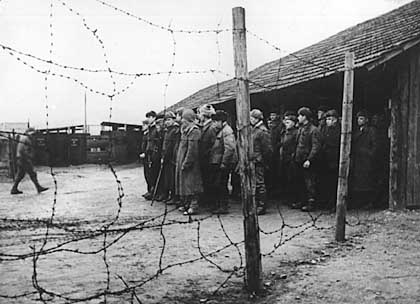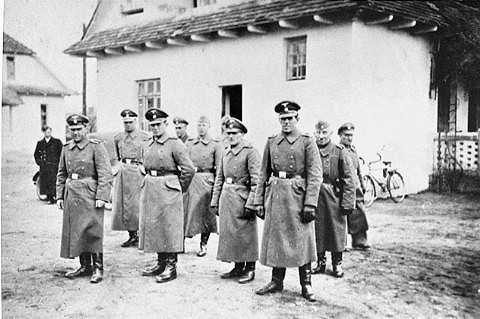Opening the Gates of the Gulag (Pt. I)

Displaying candor and alacrity that might be admirable in other circumstances, the Bush regime has made clear the purpose and impact of the Military Commissions Act,(.pdf) or MCA (better described as the “Reversal of Freedom Act of 2006″).
Two days ago (Monday, November 13), the “Justice” Department filed a motion(.pdf) to dismiss a habeas corpus action made on behalf of Ali Saleh Kahlah al-Marri, a Qatari national who was designated an “unlawful enemy combatant” by George Bush in June 2003, and confined to a Naval Brig in South Carolina.
As Jacob Hornberger of the Future of Freedom Foundation points out, the designation of al-Marri as an “unlawful enemy combatant” took place after he had been indicted for terrorism-related charges in federal courts in both New York and Illinois. Absent the president’s intervention in this case, al-Marri’s trial would likely be over, and his guilt or innocence established beyond a reasonable doubt.
Rather than permitting the criminal justice system to function, the regime simply removed al-Marri from it, as it had Jose Padilla – a US citizen (albeit a rather disreputable one) also designated an “unlawful enemy combatant” and imprisoned in the same brig. Although publicly described as an al-Qaeda recruit involved in a plot to detonate a “dirty bomb,” Padilla was an unexceptional gang-banger whom the regime was trying to recruit as an informant (and, probably, an agent provocateur). The means of “persuasion” used, according to a recent legal filing,(.pdf) was prolonged torture, including the use of psychoactive drugs.
It is clear that the Bush regime wanted to use the Padilla case to establish a precedent under which the president can designate anyone – citizen or foreign national – an “unlawful enemy combatant” and thus subject to imprisonment at presidential whim. The administration insisted that it was simply too big a security risk to grant Padilla access to our court system, and that pretense was maintained until it became clear that the matter was heading to a Supreme Court challenge it couldn’t win. Suddenly, Padilla was released from military custody by presidential decree and indicted on criminal charges that had nothing to do with a dirty bomb plot.
Al-Marri’s case is nearly identical to that of Padilla, save for the fact that he is a foreign national – and his is the case being used to validate the MCA’s suspension of habeas corpus. It’s also worth underscoring the fact that the regime’s motion to dismiss al-Marri’s habeas motion makes it clear that once an individual is designated an “unlawful enemy combatant,” he is given the burden of proving his innocence – without, of course, the means to produce the necessary evidence:
“On June 23, 2003, the President of the United States determined that, based on all the information available to him at that time from all sources, al-Marri `is, and at the time he entered the United States in September 2001 was, an enemy combatant.’… [A]l-Marri has failed to produce any evidence to rebut the government’s showing.”
The “evidence” adduced by the Great and Glorious Decider is classified, of course. It’s hardly surprising that al-Marri couldn’t rebut “evidence” he’s not permitted to inspect.
Al-Marri may very well be a dangerous individual guilty of conspiring with others to commit mass murder, but since Bush and his cohorts contrived to remove the issue from the court system, we’ll probably never know. All we know for sure is that George W. Bush, an admitted and promiscuous liar, claims that he knows al-Marri is a terrorist conspirator, and on that basis the Qatari-born prisoner remains confined in military custody.
One particularly critical element of the al-Marri case is that he – like Padilla – was arrested within the United States, rather than captured on a distant battlefield.
Critics of the Bush regime’s detention policy have made the sound and sensible point that the same powers invoked to detain al-Marri indefinitely would permit “the government to detain any foreign national declared to be an enemy combatant,” notes the Washington Post.
“In the past,” continues the Post, “foreign nationals arrested in the United States have generally had the right to challenge their imprisonment for immigration violations or other alleged crimes.”
“It’s been the case since the nation’s founding that immigrants have a constitutional right to test their detention in a court,” pointed out Jonathan Hafez of the New York University School of Law. “What it means is that any of the millions of immigrants in the United States could be arrested, taken from their homes and thrown in a military jail and denied their right to go to court.”
Rather than demonstrating the value of the MCA, the al-Marri case shows how unnecessary that measure is, and how far the regime will go to invent a “problem” worthy of the pre-ordained “solution”: Suspending habeas corpus for foreign nationals accused of terrorism-related offenses. And thanks to the Padilla case, we have tangible proof of the regime’s intention to employ the same powers against US citizens, to the extent it can get away with doing so.
I’ve remarked at great length about the epochal significance of the MCA, which destroys the foundational due process guarantee. Dispose of the habeas corpus guarantee, and the government can imprison anyone of its choosing for any reason it deems worthy, for as long as it sees fit. In a very real sense, those from whom that guarantee has been stripped become un-persons, since they have no rights that the government is required to recognize or respect.
Abolition of habeas corpus is tantamount to opening the door to the gulag.
No – that isn’t quite correct: Doing away with the “Great Writ” is an act that literally creates a legal framework for consigning people to death camps.
This has happened – not in Germany, Russia, or Cambodia, but here in the United States.
I’ll provide the details in the next installment….
Content retrieved from: http://freedominourtime.blogspot.com/2006/11/opening-gates-of-gulag-pt-i.html.







